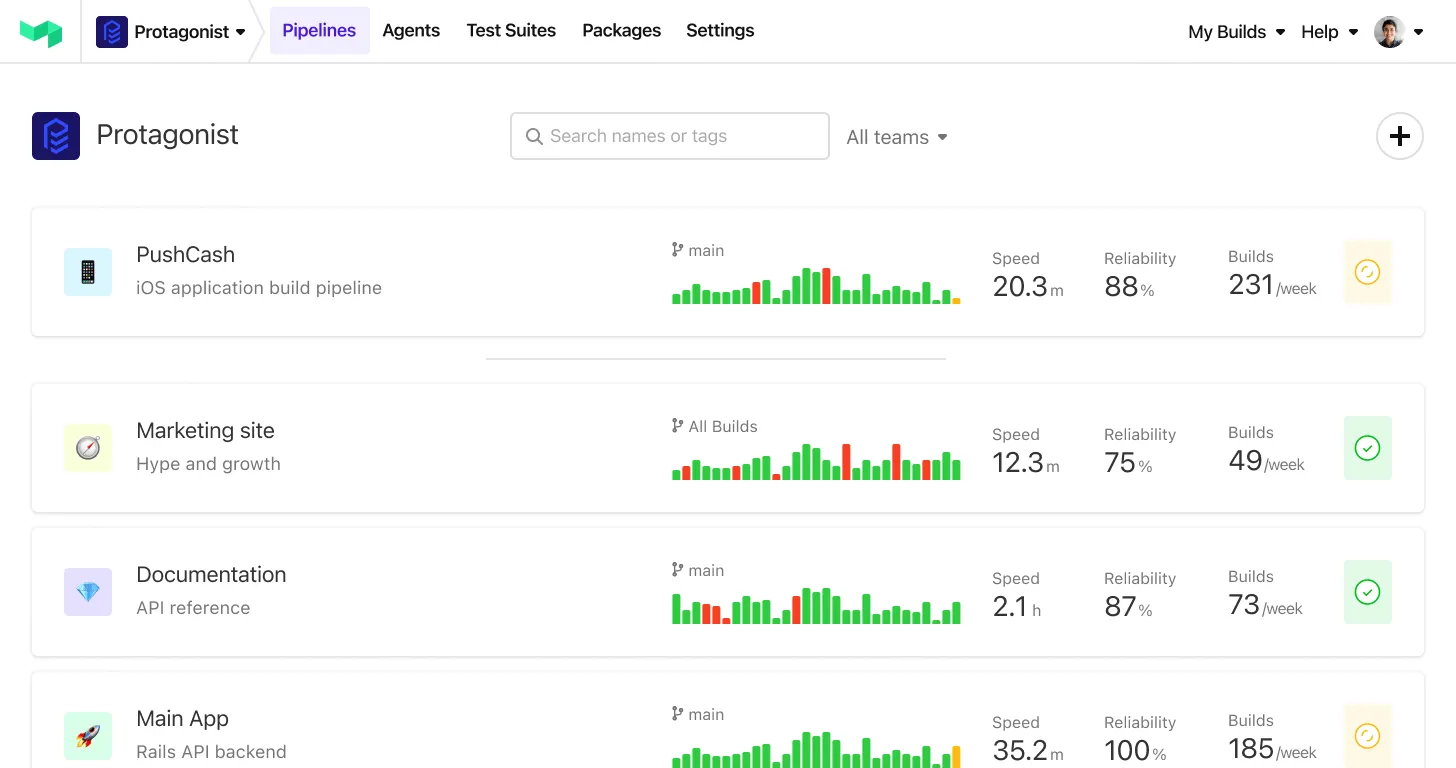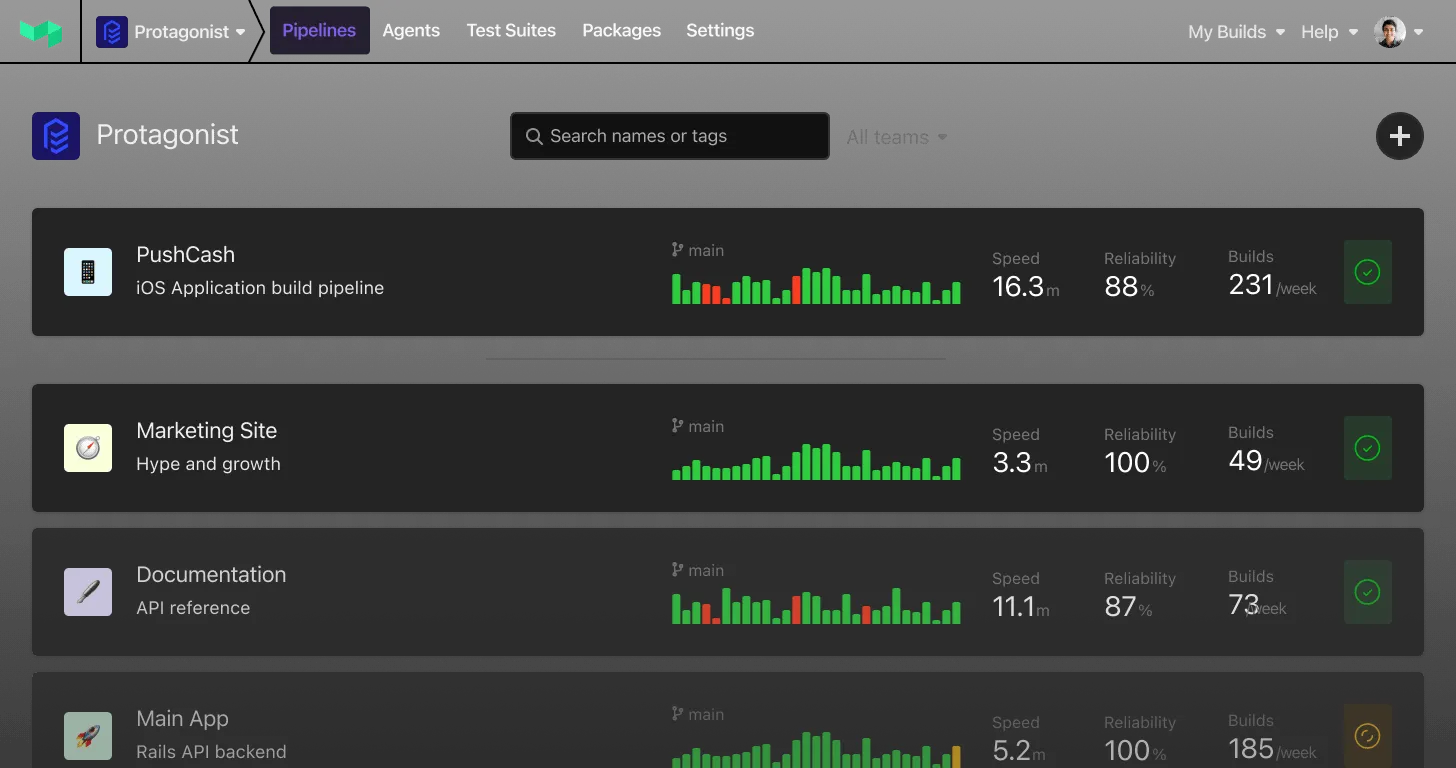Buildkite RSpec JUnit Example
This repository is an example Buildkite pipeline that collects JUnit test failures from RSpec and annotates the build with the buildkite-agent annotate command.
See the full Getting Started Guide for step-by-step instructions on how to get this running.

How it works
This example demonstrates how to:
- Run RSpec tests that produce JUnit XML output
- Parse the JUnit report for failed tests
- Use the
buildkite-agent annotatecommand to display those failures directly in the Buildkite UI
The annotation helps you quickly identify failing tests without digging through logs.
Test annotations use 2 features within Buildkite:
- The
buildkite-agent annotatecommand that allows you add arbiraty HTML and Markdown to the top of a build page - A wait step with
continue_on_failure: truewhich tells the pipeline to continue in the event of a failed step
The pipeline.yml file can be seen here:
https://github.com/buildkite/rspec-junit-example/blob/master/.buildkite/pipeline.yml
Here’s the first step:
- label: ":rspec:"
artifact_paths: "tmp/rspec-*.xml"
commands:
- "bundle"
- "rspec --format progress --format RspecJunitFormatter --out tmp/rspec-$BUILDKITE_JOB_ID.xml"
plugins:
- docker#v1.0.0:
image: "ruby:2.4"
workdir: /appThis step runs our “rspec” command within a Ruby docker container, and stores the JUnit XML data to an artifact at “tmp/rspec-f59b96d7-5d75-42a6-ab9b-d4cea59db2b2.xml”
The next step:
- wait: ~
continue_on_failure: trueTells Buildkite that if there’s a failure in the previous stage of the pipeline
(in this case, the “RSpec” tests) that it should continue the pipeline.
Usually, the wait step will fail the pipeline at this point since there was
an error - but this option changes that behaviour.
- label: ":junit:"
commands:
- .buildkite/junit.shThe last step is the one that parses our JUnit XML files, and turns them into a Buildkite annotation. Here’s the script that creates the actual annotation:
#!/bin/bash
set -euo pipefail
mkdir -p tmp
echo "--- :junit: Download the junits"
buildkite-agent artifact download tmp/rspec-*.xml tmp
echo "--- :junit::ruby: Processing the junits"
docker run --rm -v "$(pwd):/app" ruby:2.4 bash -c "cd /app && gem install nokogiri --quiet --silent && ruby /app/.buildkite/lib/junit.rb /app/tmp/*.xml" > tmp/annotation.md
echo "--- :buildkite: Creating annotation"
buildkite-agent annotate --context junit --style error < tmp/annotation.mdWe wrote our JUnit XML parser in Ruby (you can write it in what ever language
you like), but all it does it parse all the rspec-*.xml files, grabs the
errors, and turns it some HTML that looks like this:
<p>There were 3 failures:</p>
<details>
<summary><code>Calculator#multiply multiplies numbers together in spec.lib.calculator_spec</code></summary>
<code><pre>expected: 8
got: 6
(compared using eql?)
./spec/lib/calculator_spec.rb:21:in `block (3 levels) in '</pre></code>
in <a href="https://github.com/buildkite/rspec-junit-example/blob/HEAD/#f59b96d7-5d75-42a6-ab9b-d4cea59db2b2">Job #f59b96d7-5d75-42a6-ab9b-d4cea59db2b2</a>
</details>
...
</div>We then pipe that HTML into the buildkite-agent annotate command and change
the style of annotation to error so it shows up as red and with a cross in
the Buildkite UI.
- wait
- command: ".buildkite/deploy.sh"
label: ":rocket:"The final 2 steps demonstrate that the pipeline doesn’t continue any further
since there was an error in one of the previous stages. If this wait step also
had continue_on_failure: true then it would also continue.
License
See LICENSE.md (MIT)





